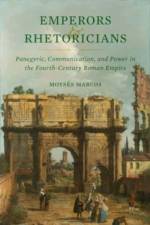av Moyses Marcos
991
"A sophisticated analysis of late Roman speeches of praise, this book demonstrates how Julian's fellow panegyrists, all of whom were members of the elite, engaged in a literary back-and forth that communicated their own demands and hopes to the emperor but also translated the emperor's intentions to those through whom he governed. The result is a series of lively, engaging snapshots of late Roman politics in action, as close to a look into the imperial mind as read by contemporaries as it is possible to get."--Susanna Elm, Sidney H. Ehrman Professor of History, University of California, Berkeley "The rhetorical outpourings of interested parties make for curious historical documents, and classical scholarship has not always been up to the challenge. Moysés Marcos's great achievement in this lively and rangy analysis of the Julianic moment is to show how high-profile panegyric could be, at once, commentary on and constitutive of imperial power play."--Roger Rees, St Andrews University, Scotland "This alert and erudite book demonstrates the powerful versatility of praise discourse as a means of political communication in the fourth century and sheds a vivid light on the emperor Julian and his entourage."--Laurent Pernot, member of the Institut de France and author of Epideictic Rhetoric "Emperors and Rhetoricians demonstrates the versatility of the panegyric as a medium of political and personal interests and offers valuable insights into communication between emperor and people in late antiquity. Marcos looks beyond the rhetoric of imperial praise to examine what was unspoken: self-promotion, insecurity, promises, and threats."--Catherine Ware, Lecturer in Classics, University College Cork, Ireland "The emperor Julian is unique in being both subject and author of imperial panegyric. Marcos has given us an invaluable and comprehensive account of Julianic panegyric, which shows just how central epideictic rhetoric was to the emperor's communicative agenda."--Alan J. Ross, Associate Professor of Classics, Ohio State University

